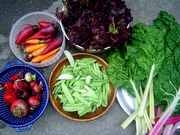

|
| Vegetable Varieties for Gardeners is a citizen science program
|
|
|
|
'Miss Megan' Onions |
| |
| Sub-Category: |
Storage/Cooking
|
| |
|
| Sub-Category 2: |
| | Description: |
Allium cepa. F1 hybrid. Short-day yellow Granex type. Green foliage reaches 12 to 36 inches with a sweet and mild tasting bulb can reach jumbo to colossal sizes. About 150 days to harvest.
* Note: Short-day onions grow well in southern states as these types requires 10 to 12 hours of daylight at the end their growth cycle to bulb up.
|
| Days To Maturity: |
150
|
| Seed Sources: |
Gurneys Seed & Nursery Co. - updated in 2019
New England Seed Company - updated in 2015
|
| |
| Rating Summary |
| |
Overall: (4.0 Stars)
Taste: (5.0 Stars)
Yield: (4.0 Stars)
Ease/Reliability: (5.0 Stars) |
| |
| Reviews |
| |
Login to share your Review of Miss Megan.
Number of Reviews: 2
Posted Pictures by Reviewers:


KEY: O=Overall Rating, T=Taste, Y=Yield, E=Ease
Reviewed on 07/08/2015 by
farmerdill
- An experienced gardener
|
 Overall Overall
 Taste Taste
 Yield Yield
 Ease Ease
|
Richmond, Georgia, United States
Frost Free Season: 183 - 203 days
Soil Texture: Sand
Garden Size: Large - More than 1,600 square feet (40' x 40')
Sun Exposure: More than 8 hours per day
|
| A mid late shortday onion that is commercially produced under the Vidalia trademark. It grows well here, but size is inconsistent under my conditions. Sapelo Sweet is much more uniform. |
 |
| |
|
Reviewed on 07/08/2015 by
farmerdill
- An experienced gardener
|
 Overall Overall
 Taste Taste
 Yield Yield
 Ease Ease
|
Richmond, Georgia, United States
Frost Free Season: 183 - 203 days
Soil Texture: Sand
Garden Size: Large - More than 1,600 square feet (40' x 40')
Sun Exposure: More than 8 hours per day
|
| A mid late shortday onion that is commercially produced under the Vidalia trademark. It grows well here, but size is inconsistent under my conditions. Sapelo Sweet is much more uniform. |
 |
| |
|
|
|
|
Vegetable Varieties for Gardeners is a citizen science program, © 2004-2024, All Rights Reserved
Cornell Garden Based Learning, Cornell University College of Agriculture & Life Sciences, Horticulture Section
|








 VVfG home
VVfG home


